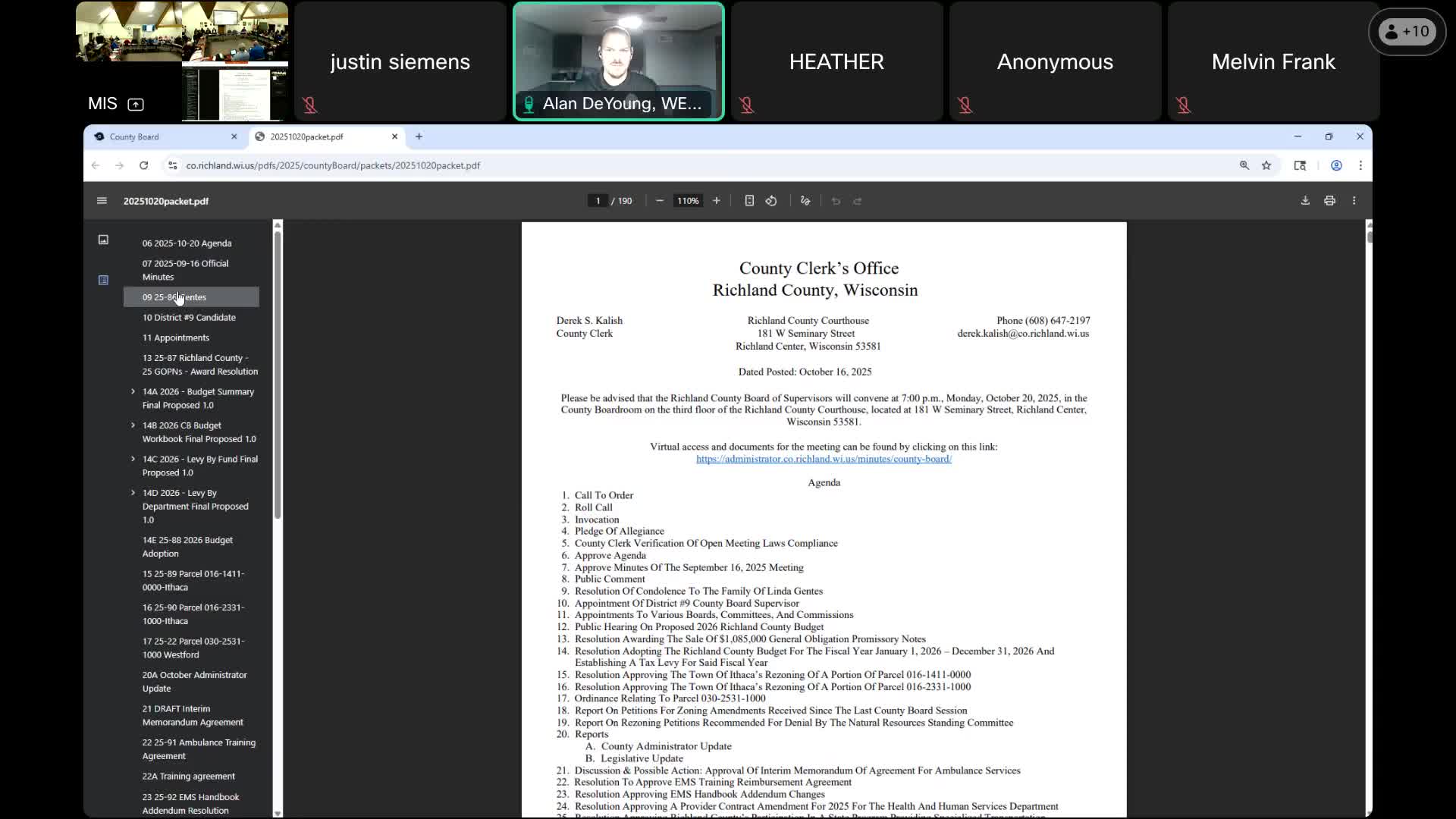Richland County wrestles with ambulance funding as board adopts amended 2026 budget
Get AI-powered insights, summaries, and transcripts
Subscribe
Summary
After public comment from EMS representatives and local officials, the Richland County Board amended and adopted its 2026 budget, approved measures that remove two municipal per‑call charges and rejected a short interim EMS memorandum of agreement, while directing further work on a countywide funding option.
Alan DeYoung, chief executive officer of the Wisconsin EMS Association, told the Richland County Board of Supervisors on Tuesday evening that the county is not alone in facing EMS financial stress and urged consideration of a countywide levy exemption that some Wisconsin counties already use to fund emergency medical services.
The board heard more than a dozen public comments from town officials, ambulance staff family members and residents who described an ambulance budget that had been solvent for years but has deteriorated recently, with rising accounts receivable and a declining cash balance. The comments preceded a lengthy public hearing on the county’s proposed 2026 budget and multiple budget amendments focused on sustaining ambulance service through 2026.
Why it matters: The county is the operating entity for ambulance service in Richland County and the budget decisions will determine whether current staffing and service arrangements continue through 2026. Public commenters and township officials pressed the board for county action to prevent service interruptions and to avoid shifting large per‑call charges to individual townships and the city of Richland Center.
What was said and done
Alan DeYoung, Wisconsin EMS Association CEO, told the board the county has a statutory option to levy outside local levy limits to fund a countywide EMS system and said about 14 Wisconsin counties use that approach. “When you dial 911, you expect EMS to respond,” DeYoung said, urging the county to consider a countywide levy exemption and to consult other counties’ experience.
Town and municipal officials described sharp financial changes inside the ambulance operation. Gordon Palmer, representing Richland Township, said the operation had a healthy monthly cash balance through 2019 but that “from 2023 until August 2025 we have had a monthly cash balance that has gone from averaging over $200,000 to a negative $148,293.” Daniel Tim, Henrietta Township chair and a member of the Joint Ambulance Committee, said accounts receivable rose from about $60,000 on Jan. 1, 2025, to roughly $280,000 by Oct. 31, 2025, according to committee financial statements.
County staff and the administrator (Trish) said the ambulance budget presented for 2026 was pared to a bare‑bones, break‑even plan after recalculations. Staff told the board they had previously expected roughly $50,000 in surplus that is no longer available, and that municipalities’ projected payments were reduced after an internal correction of an erroneous line item.
Board action and amendments
- The board approved an amendment that removed the Pine Valley ambulance call charges that would have been billed to Richland Township and instead allocated that revenue back to the county ambulance budget. (Motion to amend: Supervisor Engel; second: Supervisor Severson. Voice vote: ayes prevailed.)
- The board approved a second amendment eliminating per‑call charges for the City of Richland Center for calls to county‑owned facilities and funded that change by moving about $4,000 from the parks budget. (Motion to amend: Supervisor Severson; second: unnamed. Voice vote: ayes prevailed.)
- The board considered but rejected a three‑month interim memorandum of agreement that some municipalities had requested as a short‑term measure. The three‑month MOU was defeated in a voice vote and the board directed staff to proceed with the previously distributed 12‑month contract form while continuing discussions with municipalities.
- After the amendments and discussion, the board adopted the 2026 county budget (Resolution 25‑88) as amended. (Motion: Supervisor Perry; second: Supervisor Kramer; voice vote: ayes prevailed and the resolution was adopted.)
What the board asked staff to do
Supervisors repeatedly asked staff to model a countywide levy option and to develop numbers quickly. Administrators said preparing a levy‑exemption plan that accurately accounts for services provided inside and outside the county’s current service area is complicated and that staff capacity was limited; they recommended contracting with external consultants if the board wished to pursue a levy exemption under state law. The county’s deadline for final levy numbers for tax bills was noted as roughly Nov. 15, which makes a rushed, accurate implementation difficult.
Context and next steps
County staff said Pine Valley Community Village will make $750,000 in excess revenues available to the general fund in 2026 and the 2026 budget uses roughly $245,292.86 from the general fund as part of its funding plan. Administrators said they will provide revised contracts to municipalities reflecting the amendments passed tonight and will form a committee to work on long‑term funding options for 2027 and beyond. Several supervisors urged a collaborative process that includes townships, municipalities and outside advisors so any county levy or other change is based on signed agreements and a transparent financial model.
Ending note: Several township chairs and residents warned that their boards may decline to sign the county contract; administrators said staff would continue to negotiate and present updated options to the board ahead of levy deadlines.
